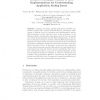Free Online Productivity Tools
i2Speak
i2Symbol
i2OCR
iTex2Img
iWeb2Print
iWeb2Shot
i2Type
iPdf2Split
iPdf2Merge
i2Bopomofo
i2Arabic
i2Style
i2Image
i2PDF
iLatex2Rtf
Sci2ools
154
click to vote
PVM
2010
Springer
2010
Springer
Toward Performance Models of MPI Implementations for Understanding Application Scaling Issues
Abstract. Designing and tuning parallel applications with MPI, particularly at large scale, requires understanding the performance implications of different choices of algorithms and implementation options. Which algorithm is better depends in part on the performance of the different possible communication approaches, which in turn can depend on both the system hardware and the MPI implementation. In the absence of detailed performance models for different MPI implementations, application developers often must select methods and tune codes without the means to realistically estimate the achievable performance and rationally defend their choices. In this paper, we advocate the construction of more useful performance models that take into account limitations on network-injection rates and effective bisection bandwidth. Since collective communication plays a crucial role in enabling scalability, we also provide analytical models for scalability of collective communication algorithms, ...
Related Content
| Added | 30 Jan 2011 |
| Updated | 30 Jan 2011 |
| Type | Journal |
| Year | 2010 |
| Where | PVM |
| Authors | Torsten Hoefler, William Gropp, Rajeev Thakur, Jesper Larsson Träff |
Comments (0)

